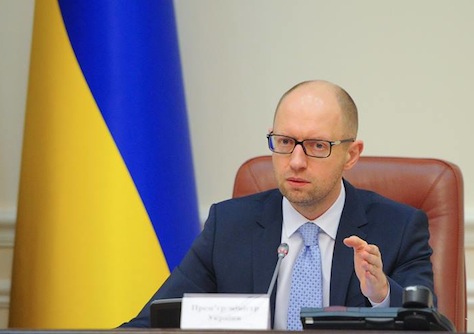Another week, another crisis in Ukraine.![]()
Just days after the downing of Malaysian Airlines flight MH17, Ukraine’s prime minister Arseniy Yatsenyuk offered to resign after two parties left the five-month ruling coalition that formed in the wake of Viktor Yanukovych’s flight from office back in February.
Those five months have witnessed an incredible amount of activity in Ukraine: Russia’s annexation of Crimea, the rise of Russian-backed rebels in eastern Ukraine, the May election of Petro Poroshenko as the country’s new president, and the crash of Flight MH17.
Those two parties, the right-wing nationalist All-Ukrainian Union “Svoboda” (Всеукраїнське об’єднання «Свобода») and the Ukrainian Democratic Alliance for Reform (UDAR, Український демократичний альянс за реформи) of newly elected Kiev mayor and former heavyweight boxing champion Vitaliy Klychko, ostensibly left the government over the onerous conditions that Yatsenyuk was trying to enact into law pursuant to the $17 billion loan package provided by the International Monetary Fund, which contemplates that Ukraine will bring its budgets closer into balance. It’s understandable that lawmakers aren’t keen to introduce austerity measures with an ongoing insurgency in eastern Ukraine and with the economy still in shambles — it could contract by as much as 6.5% this year, and the Ukrainian hryvnia has lost nearly 30% of its value so far in 2014.
But Svoboda and UDAR, which joined the pro-Western government alongside Yatsenyuk’s own ‘All Ukrainian Union — Fatherland’ party (Batkivshchyna, Всеукраїнське об’єднання “Батьківщина), knew the strings attached to the IMF loan from the outset.
Why now?
The answer may lie with Poroshenko, who appears to have signaled that he would welcome bringing forward parliamentary elections that are otherwise scheduled to take place in 2017. If no coalition government can be formed within 30 days of Yatsenyuk’s resignation, snap elections must be held. If that happens, as expected, almost everyone believes that Poroshenko will call elections for sometime in October, notwithstanding the ongoing military efforts to subdue the eastern rebels.
When Poroshenko took office in June, Yatsenyuk, who has thanklessly steered Ukraine’s domestic policy as well as can be imagined since February, stayed on as prime minister. But many Ukrainians have argued that the 2012 elections, which resulted in a majority coalition for Yanukovych’s deflated, pro-Russian, eastern-based Party of Regions (Партія регіонів), should no longer determine the composition of Ukraine’s 450-member Verkhovna Rada (Supreme Council).
Instead, with so many former pro-Yanukovych legislators having abandoned the Party of Regions, all of the relatively pro-Western and right-wing actors in Ukraine today — including Poroshenko, UDAR, Svoboda and even elements within Yatsenyuk’s Batkivshchyna — believe that early elections could effectively cleanse pro-Russian legislators from the Verkhovna Rada.
Moreover, Poroshenko doesn’t really have much of a party apparatus to back his presidency, though he’s largely governed in tandem with the tripartite alliance among UDAR, Svoboda and Batkivshchyna. Having now reconstituted Solidarity (Солідарність), the party that Poroshenko founded way back in 2001, Ukraine’s new president stands a strong chance of winning the most support in new elections.
Given the background of many Svoboda leaders, their continued presence in government has given fodder to critics who have called out Svoboda for anti-Semitic rhetoric and otherwise hard-right views. Moreover, it’s also somewhat awkward for Poroshenko to rely on Batkivshchyna, given that its leader Yulia Tymoshenko was his nearest competition for the Ukrainian presidency in the May 25 election.
Parliamentary elections in October could give Poroshenko an opportunity to consolidate his strength relatively early in his presidency, rather than depend on the good graces of opposing parties or for 2017, when he might well become as unpopular as his two predecessors, Yanukovych and the pro-Western Viktor Yushchenko.
Nevertheless, it’s not necessarily a flawless strategy. While it’s only been a few short weeks since his inauguration, Poroshenko’s his supporters could easily sour on his leadership, even as soon as October, if he continues to stumble in pacifying Ukraine’s eastern regions or if his attempts to thwart the Russian-backed rebels in Donetsk and Luhansk oblasts backfire. Even over the next three months, the gloom of economic pessimism could make it difficult for Poroshenko’s Solidarity to fend off more populist challenges. For example, recent polls show that former presidential contender Oleh Lyashko, a virulently populist, anti-Russian, right-wing figure, is gaining in popularity. That means his Radical Рarty (Радикальна Партія) could outpower Svoboda and emerge as a key player, or even the largest faction, in parliamentary elections.
There are also risks to Poroshenko if voters believe he is trying to play politics at a time when Ukraine’s future as a united country depends on his military and diplomatic success. Even as Poroshenko reaches out to Belarussian president Aleksandr Lukashenko to act as a mediator with Russian president Vladimir Putin, eastern rebels and other stakeholders in Ukraine’s ongoing crisis, many Ukrainians might feel that the best time for a prolonged parliamentary election campaign should come after a ceasefire.
Holding hasty elections before a resolution to the situation in eastern Ukraine could also backfire on Poroshenko in his efforts to unite the country. Without a means of peaceful voting in the east, the newly elected parliament will almost certainly exclude, or diminish, eastern voices, giving the rebels even more justification to defy the central government in Kiev.
